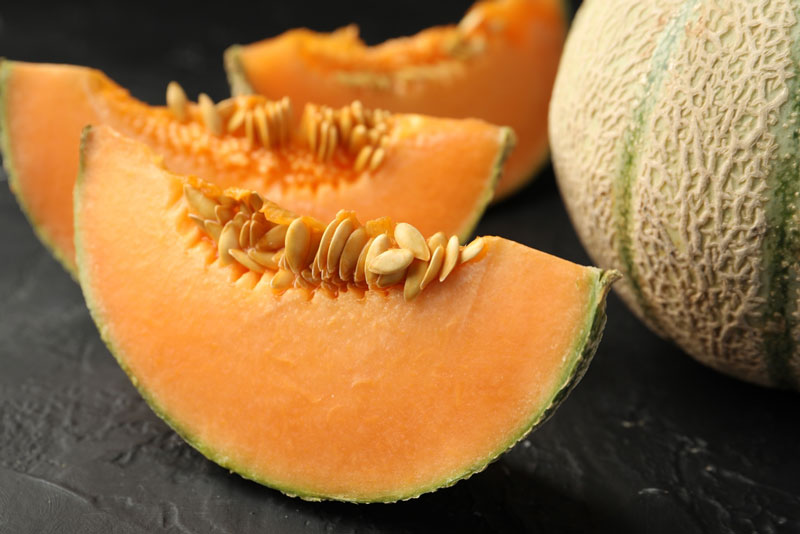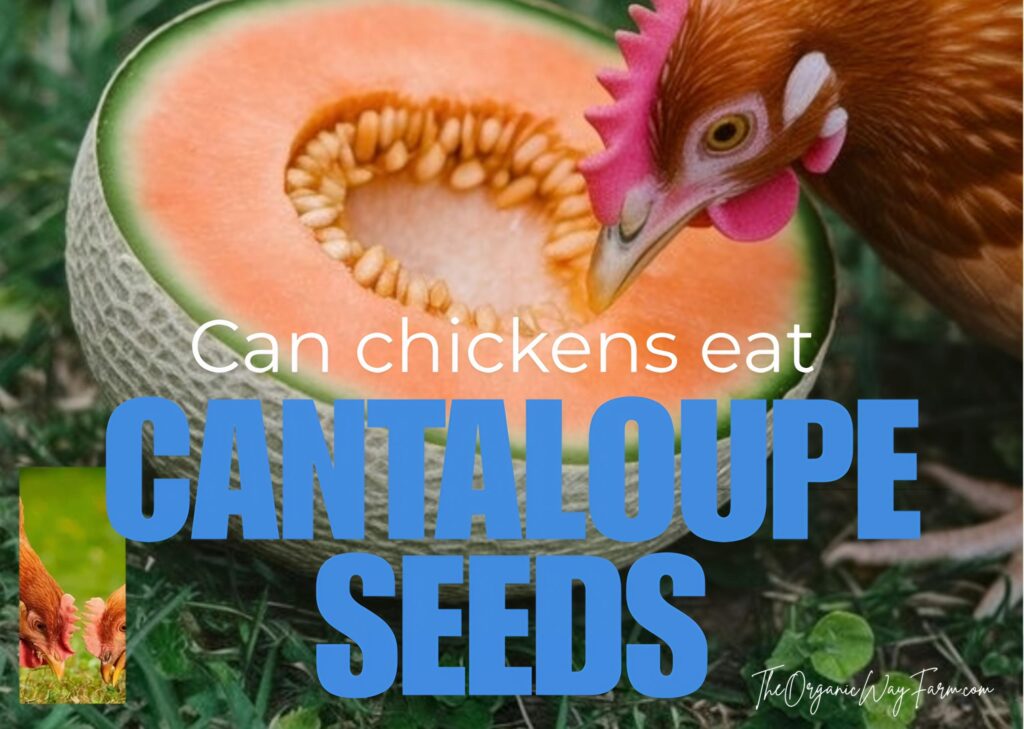If you have ever enjoyed a sweet, juicy cantaloupe, you might wonder if your chickens can share in this delicious fruit. The great news is that chickens can eat cantaloupe and its seeds. But how safe is it, and how should we serve it to them? This is a popular question among farmers and chicken lovers alike.
So, can chickens eat cantaloupe seeds? The answer is a resounding yes! Cantaloupe seeds are non-toxic to chickens, and they can enjoy the seeds along with the flesh of the melon. When we provide our chickens with fruits like cantaloupe, it can be a fun and nutritious treat for them.
As we explore this topic further, we will learn about the best ways to feed cantaloupe and its seeds to our feathered friends, the health benefits, potential risks, and even some ideas for substitutes if we don’t have cantaloupe on hand. Let’s jump right into the details!
- Can Chickens Eat Cantaloupe Seeds?
- How Much Cantaloupe Seeds Can Chickens Eat?
- Best Way to Feed Cantaloupe to Chickens
- Benefits of Feeding Cantaloupe to Chickens
- Risks and Dangers of Feeding Cantaloupe Seeds
- Substitutes for Cantaloupe
- Frequently Asked Questions
- Final Thoughts
Can Chickens Eat Cantaloupe Seeds?

Cantaloupe, a sweet and nutritious fruit, is safe for our chickens to enjoy. When we think about all the different parts of the cantaloupe, we can be happy to know that both the flesh and the seeds are suitable for them. The seeds of the cantaloupe don’t pose a threat to their health and can be a part of their healthy diet. In fact, these seeds can add some interesting textures to their meals and can also be a bit of fun for them as they scratch around and explore their feeding area.
We might notice that chickens have specific preferences when it comes to food. Some may enjoy the fruit’s sweetness more than others. However, it is good practice to introduce any new foods gradually, including cantaloupe and its seeds. This way, we can monitor how well they accept it and whether there are any changes in their behaviors following the introduction of this new treat.
How Much Cantaloupe Seeds Can Chickens Eat?
Cantaloupe seeds can and should be fed to chickens in moderation. When considering how much to give, we can think about the size of the chicken and their overall diet. Cantaloupe should just be a small part of their treats. It is essential to remember that the majority of their diet should consist of commercial poultry feed and some grains. Too many treats, even healthy ones like cantaloupe or other fruits, can disturb their digestive systems.
A good guideline is to offer a couple of slices of cantaloupe, including the seeds, every few days. This way, chickens can enjoy it as a refreshing snack, especially during the hotter months when they need extra hydration. We can start with small pieces and monitor our chickens and how they are reacting to this new addition. Each chicken may have different preferences and how they enjoy the seeds and the flesh.
It’s also essential to consider that chickens, being natural foragers, may not eat all of the seeds at once. They will nibble and play around as they investigate their food. If there are leftovers, it could be seamlessly reused in a different feeding round so that nothing goes to waste! Always adjust the portion based on your flock’s overall food intake and activity level.
Remember that providing cantaloupe seeds is a fun and excellent approach to keeping our chickens engaged, happy, and healthy. We can observe their reactions and savor the moments of delight on their faces.
Best Way to Feed Cantaloupe to Chickens
The best way to feed cantaloupe to chickens involves a bit more than just tossing slices on the ground. We can start by washing the cantaloupe thoroughly to remove any pesticides or harmful residues on the surface. It’s essential to ensure that we are not sending harmful chemicals to our birds.
Once cleaned, we can cut the cantaloupe in half and remove the seeds. At this stage, we can either mix the seeds with the flesh or keep them separate – this might depend on how our chickens tend to eat their treats. Some might prefer to nibble on the sweet fruit first before going for the seeds, while others might enjoy chewing the seeds and flesh simultaneously.
Another creative way to serve cantaloupe is to hang or secure it in their coop or run. Chickens are naturally curious creatures, and this will allow them to engage more with their food. They can poke and scratch at it, which can also serve as a form of entertainment for them. It’s like a refreshing puzzle that keeps them stimulated while encouraging natural pecking and exploring behavior.
Chickens are smart and can quickly learn to enjoy new foods. Watching them interact with the cantaloupe will be both entertaining and heartwarming. Plus, we can also use cantaloupe as a bonding moment; bonding with our flock while providing them with delicious and healthy snacks creates a happy atmosphere.
Benefits of Feeding Cantaloupe to Chickens
Hydration
Cantaloupe is made up of about 90% water, making it a fantastic hydrating treat, especially during warm weather. We want our chickens to stay hydrated at all times because they tend to lose fluids through heat and increased activity levels. Offering them juicy fruits like cantaloupe is a wonderful way to help keep their water intake balanced and supports overall health.
Fiber
Another benefit of cantaloupe is its fiber content. Fiber plays a vital role in aiding digestion, which is essential for chickens. A healthy digestive system allows chickens to absorb nutrients better from their food. Plus, a diet rich in fiber helps maintain regular bowel movements.
Vitamins and Minerals
Cantaloupe is chock-full of vitamins and minerals that contribute to chickens’ health. Vitamins A and C are crucial for their immune system and can help prevent diseases. Additionally, they provide minerals like potassium which aids in regulating heart functions and maintaining healthy muscles.
Mental Stimulation
Feeding cantaloupe and letting chickens interact with it also contributes to their mental stimulation. Offering a new type of food can provide enrichment, encouraging them to explore and develop their natural foraging instincts.
Nutritional Breakdown of Cantaloupe
While it’s not practical to share all nutritional components of cantaloupe, it can be helpful to understand that this fruit is low in calories while being rich in essential nutrients required for our chickens’ overall well-being. Ensuring variety in their diet helps us provide a balanced and nutritious meal for our flock.
Risks/Dangers of Feeding Cantaloupe Seeds to Chickens
While cantaloupe seeds are not dangerous, we must be mindful of how we introduce them to our chickens. Some risks can arise if we offer them in excessive amounts. Overfeeding any food, including cantaloupe seeds, can lead to digestive disturbances. We want to ensure that our chickens do not experience upset stomachs or diarrhea from sudden changes in their diets.
Another consideration is choking hazards. If the seeds are too large, or if a chicken tries to gulp it down too quickly, it risk choking. To prevent this, we can always break up the seeds into smaller pieces or offer them in moderation. Keeping portions controlled is important to ensure the safety and well-being of our birds.
Lastly, it’s crucial to avoid feeding chickens any part of the cantaloupe that might be moldy or rotten. Mold can produce toxins that could harm our birds, so being vigilant when selecting and preparing their food can help keep them safe.
Substitutes for Cantaloupe
If we don’t have cantaloupe at hand, several other fruits can serve as great substitutes. Watermelon is another excellent choice, as it also contains high water content and can keep our chickens hydrated. Strawberries, blueberries, and other berries make delightful alternatives. Chickens can also enjoy small amounts of apples, pears, and bananas.
Just like with cantaloupe, moderation is key when feeding these fruits. We can provide variety and a balanced diet to our chickens by rotating different fruit treats. They will appreciate the new flavors, and we will enjoy seeing their happy, healthy reactions as they sample different foods.
Frequently Asked Questions
Can chickens eat organic cantaloupe?
Yes! Organic cantaloupe is safe and often better for your chickens as it may contain fewer chemicals compared to conventional melons.
Can my chickens eat cantaloupe rind?
Chickens can nibble on cantaloupe rind. However, it’s better to avoid overfeeding them the rind as not every chicken will digest it well.
Is cantaloupe a good treat for chickens?
Cantaloupe is an excellent treat for chickens due to its hydration, vitamins, and overall deliciousness!
How often can I feed cantaloupe seeds to my chickens?
It is best to feed cantaloupe seeds in moderation as a treat, perhaps a couple of times a week, alongside their regular feed.
Can chickens eat too much fruit?
While fruits are tasty and nutritious, they should only make up a small portion of a chicken’s overall diet to maintain a balanced intake.
Final Thoughts
Feeding cantaloupe to our chickens can be an enjoyable and beneficial experience. This delicious fruit can provide numerous health benefits while keeping our flock happy and enriched. As we try bringing new foods into their diets, let’s watch their interactions and be mindful of portion sizes. If we ever lack cantaloupe, numerous fruit alternatives can keep our chickens healthy and engaged. If you want to learn more about what else our chickies can gobble up, check out the link on grapes for chickens. Happy feeding!






